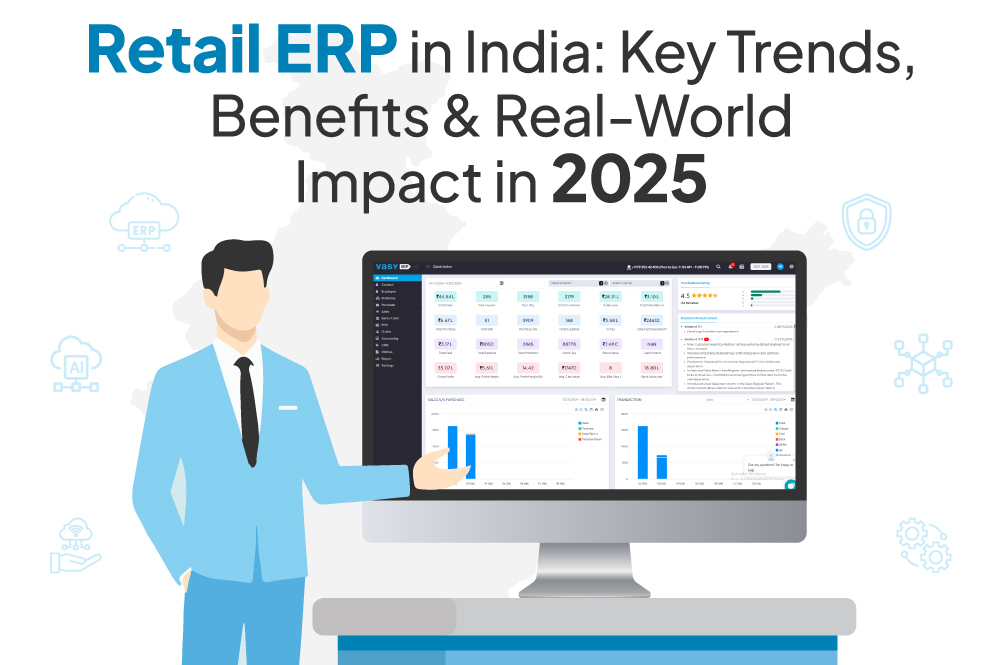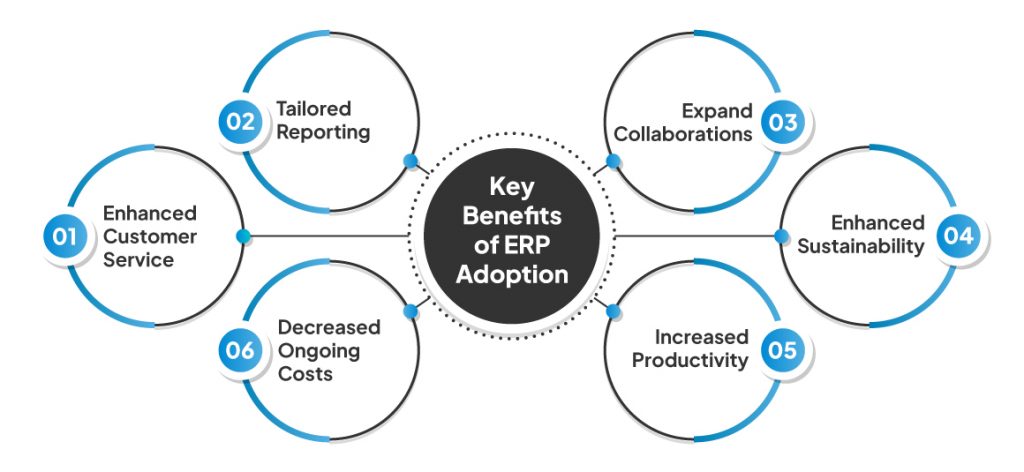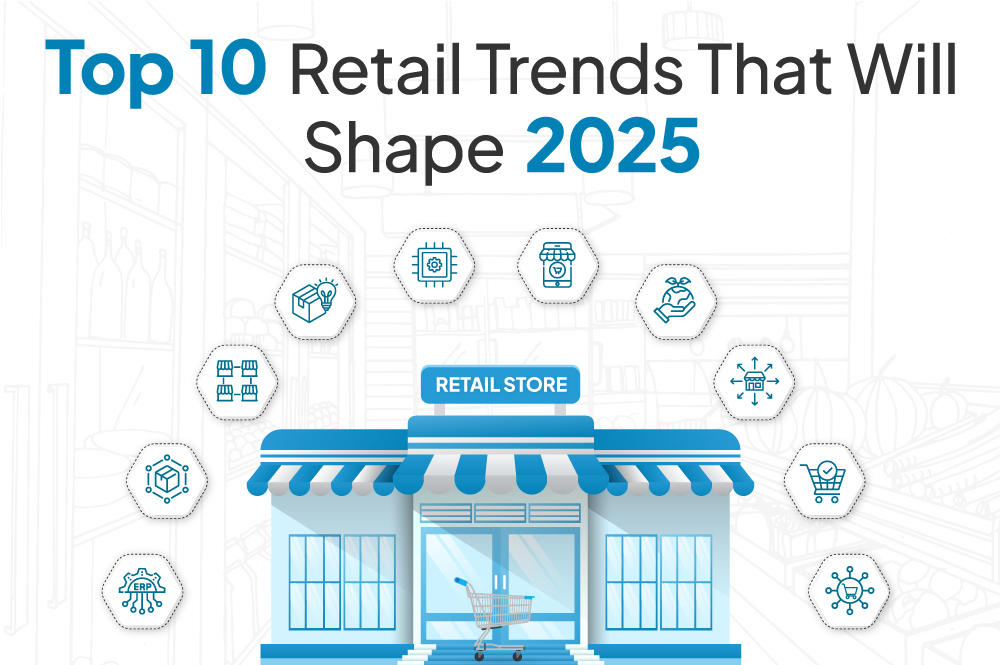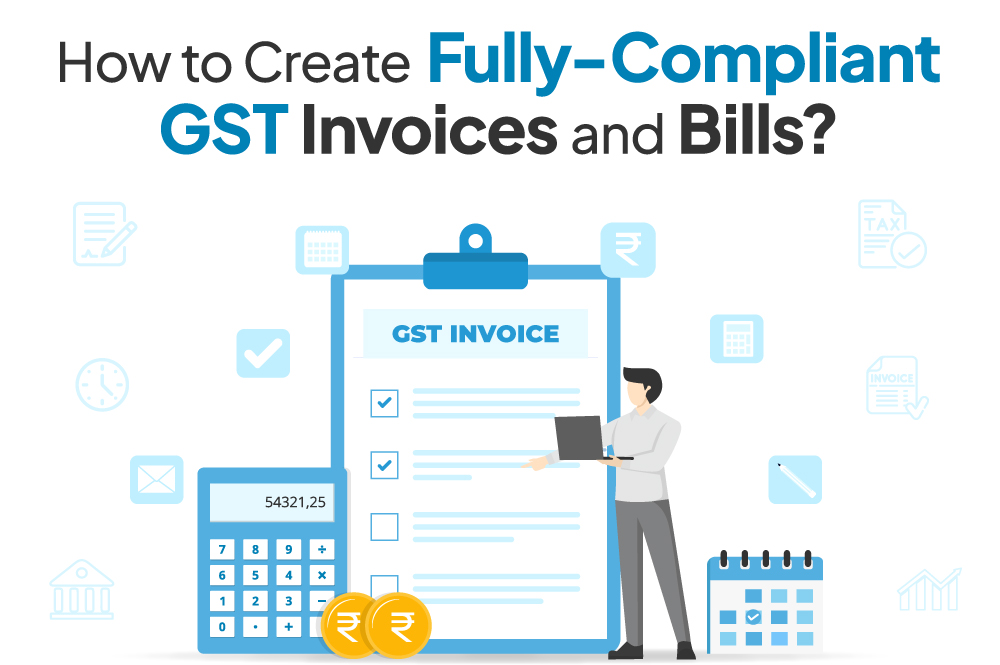Retail ERP in India: Key Trends, Benefits & Real-World Impact in 2025
July 23, 2025

Explore the latest trends in ERP adoption in India, including Cloud, IoT, ONDC, and learn how these technologies simplify retail operations and boost business revenue.
India has seen a dramatic hike in the use and advancement of Enterprise Resource Planning (ERP) in the past few years. The Enterprise Resource Planning (ERP) market in India was estimated to be worth USD 1.78 billion in 2025 and is projected to grow at a compound annual growth rate (CAGR) of 7.39% to reach USD 2.73 billion by 2031. This strong expansion demonstrates how Indian businesses are depending more and more on ERP solutions to improve agility, streamline processes, and keep a competitive advantage.
With changing customer buying patterns and behavior, retailers these days are assessing how they can simplify their daily operations and boost customer satisfaction. Hence, more retail businesses are adapting ERP software in India to get access to simplified sales and inventory management to easy billing. Whether you are an owner of an imitation jewellery store, Kirana shop, Bakery shop or readymade garment store choosing the best retail ERP in India can ease your everyday tasks.

Switching to cloud-based ERP solutions is another major trend that retail businesses are adapting these days. Cloud-based ERP software offers advantages like reduced upfront expenses, scalability, and accessibility from any location simply by using an internet connection. ERP software development companies in India are providing cloud-based solutions to satisfy the rising need for flexible and cost-effective ERP solutions.
About 70% of ERP systems were cloud-based in 2024; by 2025, this percentage is expected to rise to 60% of all deployments. Compared to on-premise ERP solutions, businesses experience ~40% faster installations and ~20% cost reductions.
AI is increasingly being used as a fundamental part of ERP systems to improve operational efficiency and decision-making. By using Artificial Intelligence’s Machine-Learning (ML) algorithms and data analytics features, ERP solutions automate everyday tasks, including invoice processing, predictive financial demands. AI in ERP systems spot patterns
AI-powered ERP enhances operational efficiency by up to 40% and 85% of retailers now use AI features. By 2025, 65% of ERP providers intend to incorporate AI/ML.
The Internet of Things (IoT) has a significant impact on the future of enterprise resource planning (ERP) systems in India. Using Internet of Things (IoT), organizations can gather real-time data from a variety of equipment and devices then feed that data straight into ERP platforms for prompt analysis and action. This action will revolutionize multiple industries like manufacturing, agriculture, logistics, etc.
ERP systems with IoT capabilities increase supply chain effectiveness by 35%.
The understanding that security is critical to technological success will lead organizations to actively strengthen their safety measures. Partnerships with managed service providers will be critical in navigating this environment to establish and sustain resilience against cyber risks, especially as the use of AI in operations expands.
AI-powered cybersecurity solutions, capable of anticipating and eliminating cyber-attacks before they do damage, will become standard. Proactive protection mechanisms will become the focus, with AI constantly learning and adapting to new threats.
As per Forbes report, multi-factor authentication, data encryption, and constant surveillance are now accepted. AI-based threat detection solutions are becoming mandatory.
In a linked business world, security, transparency, and traceability are becoming more and more important. To meet these demands, blockchain integration in ERP software will be crucial. We anticipate that by 2025, blockchain will play a key role in Retail ERP trends in India, providing better data protection, fraud prevention, and supply chain transparency, especially in industries like finance, agriculture, and pharmaceuticals.
In 2024, the size of the Indian blockchain market was USD 656.99 million. According to IMARC Group's forecast, the market would increase at a compound annual growth rate (CAGR) of 65.60% from 2025 to 2033, reaching USD 61,532.00 million.
Retail ERP for small businesses India are now providing integrations to retailers in listing their products, managing orders, and syncing inventory across India’s biggest ONDC (Open network for digital commerce) platform. This makes it possible for small shops to compete with big-commerce companies, and expand their market reach.

The business world is extremely competitive, and this is no exception when it comes to recruiting and retaining customers. Customer satisfaction is important for every firm, and ERP software solutions can help enhance customer trust and relationships. Because a modern system, such as ERP software, centralizes all client information, it allows for faster customer service and a more tailored approach.
ERP consolidates contact details, order history, previous support cases, and other data into a single, single dashboard. Because ERP monitors past orders and manages real-time inventory, the client is far more likely to get the appropriate data on time. If such qualities are in place, a consumer is far more likely to depart satisfied and return for more in the future.
Real-time data reporting is the key feature of an Retail ERP software solution in India that delivers a significant benefit over other business management systems. ERP reporting technologies enable firms to customize reporting across a wide range of operations, including finance, inventory, procurement, and human resources, and compute it based on what is most important to the organization. This tailored approach allows businesses to assess the KPIs that are most important to them while also tracking the performance of various business components.
Another advantage is that Cloud ERP for India provides up-to-date data in real time. This means that when an employee attempts to assess an issue, they do not have old data to study, but rather the most accurate and up-to-date numbers to refer to. Customized reporting can assist an organization in making educated decisions, which is crucial in today’s fast-changing business climate.
The way ERP solutions are designed allows for outstanding collaboration across departments. With integrated applications and data storage all in one package, teams have a clear picture of how each function contributes to the business.
With the ERP system in place, teams can communicate on a single platform. Back-end integration is critical since it allows staff to collaborate and work together. With access to all data, an individual can identify a flaw or anything that reduces duplicating effort. This increased collaboration can improve decision-making by providing a single source of information for all data entry.
The constantly shifting business world has placed a high priority on sustainability. Boards, investors, customers, and others are putting pressure on companies to reduce the adverse effects of their carbon footprint. Surprisingly, those who beat their competitors in terms of both environmental and financial performance have the most deeply involved ERP implementation.
Retail ERP software in India opens up employees to focus on more important activities, resulting in enhanced productivity. The ERP system increases productivity in a variety of ways, all of which come from automating basic tasks and simplifying processes. An ERP system’s streamlined approach saves time spent searching for information, allowing employees to complete other activities more quickly. Manual data entry is not required, making tasks like inventory management and metrics tracking considerably easier.
With a view of the entire organization, employees are no longer faced with locating the appropriate data set or the employee who understands how a specific process works, allowing them to focus on more essential activities and initiatives. ERP solutions provide these functionalities through technologies such as artificial intelligence (AI), machine learning, robotic process automation, and others. These technologies help ERP software programs automate and provide intelligent suggestions.
The structure of an ERP solution ensures that data is entered only once but serves various uses throughout the firm. This can save the firm time and money by streamlining duplicate tasks. The initial fees and cost reductions will vary depending on the type of ERP solution you select.
Without an integrated ERP software solution, firms must rely on several systems to operate their operations. The more systems, the greater the potential IT costs. An ERP system could potentially lower those expenditures. Separately, it might cut end-user training requirements because they would only have to learn one system. This could result in increased profitability and fewer disruptions.
Key Takeaways
ERP systems provide substantial benefits, including automation and data accuracy.
- 89% of ERP users believe that improved efficiency is the most important advantage.
- ERP lowers manual errors by 70%, which improves operational accuracy.
- Companies expect a 30% ROI boost within three years of implementing ERP.
A mid-sized Indian retail chain with approximately 30 outlets faced difficulty in managing inventory, invoicing process, and other supply chain processes. They hired employees for manual data entry which led to several errors, mismanagement, delayed reporting, and reduced visibility into real-time sales. In 2023, the company adapted a Cloud-based ERP system to streamline its daily business operations. Only after three months, the retailer gained 25% improvement in inventory management, and reduction in out-of-stock situations. A single dashboard enabled real-time sales tracking and automated reordering, resulting in a 20% boost in operational efficiency.
Also, the ERP software allowed the generation of GST-compliant invoices and GST reports saving in more time and reducing errors in accounting. The built-in CRM module allowed the retailers to notify customers with customized SMS regarding latest deals, offers, discounts, etc. leading to more satisfied customer experience. This shows how ERP tools can empower retail businesses to boost customer engagement and make data-driven decisions regardless of size of the business.

A complete ERP software system for the manufacturing industry enhances a company’s decision-making capabilities. ERP software for the manufacturing industry provides you with real-time business information, which will increase production and efficiency. ERP software for the manufacturing industry reduces labor costs while improving precision and error rates
The use of UPIs in semi-urban and rural areas grew over 118% in 2023. MSMEs in semi-urban or rural areas reported over 73% growth using digital payment tools like UPI and mobile software. ERP software integrated with various payment modes enhances overall revenue processes.
Multiple retail chains including grocery, fashion, consumer electronics shared that they have approx. gained 35% rise in supply chains, inventory monitoring and demand forecasting.
Patient safety is the first priority for all healthcare organizations. ERP software for healthcare eases communication between patients and clinics. When a patient calls for an emergency, the clinic must be able to get a patient’s record and so several healthcare organizations are adapting ERP software.
The transition from a legacy system to ERP software for local kirana stores to multichannel retail outlets can be a challenging task. When choosing an ERP solution, it is important to bring in specialists to ensure a smooth and transparent implementation process.
VasyERP can assist your organization in effectively migrating traditional ERP software to the cloud, redesigning processes to harness data, AI, and automation, and transforming finance into a competitive advantage for your business.
By adopting ERP, retailers can benefit from:
Retail ERP solutions are now important for revolutionizing the retail business management process. Its latest features enable retailers to improve customer satisfaction, increase operational efficiency, and successfully negotiate the constantly changing retail environment. If you are searching for robust, scalable and Cloud-based ERP software to help you grow your retail business, contact us and request for a free demo!

It's time we deliver the experience of seamless checkou...
April 7, 2025

Are you a retailer or wholesaler looking to create full...
September 11, 2024
